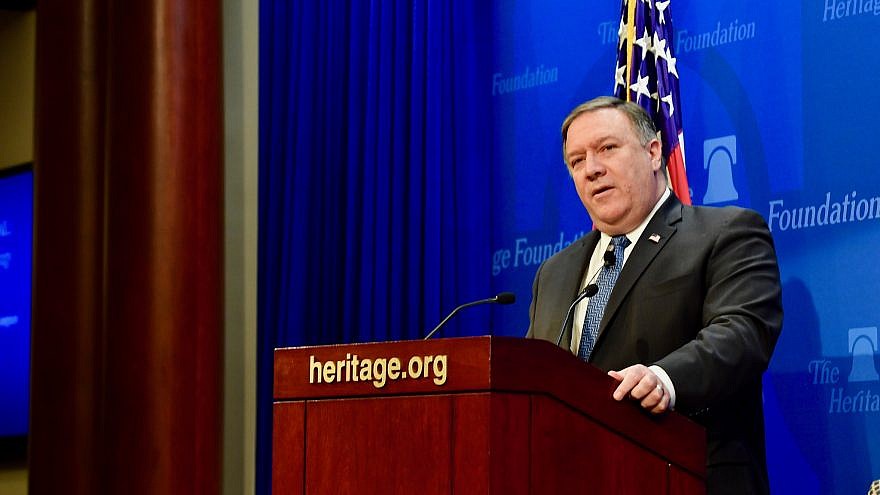In his first major foreign-policy address since taking office in April, U.S. Secretary of State Mike Pompeo articulated the Trump administration’s new policy regarding Iran, which demands that the country halt its ballistic-missile program, provide access to military bases for inspection, and end its belligerent activities in the region and abroad. Pompeo also threatened Iran with “the strongest sanctions in history.”
With Pompeo’s announcement and effort to confront Iran, the question is what Iran will do next.
“Things have been quiet in the Persian Gulf over the past year or so, and I wouldn’t be surprised if Iran begins the kind of provocative behavior we saw in recent years with the IRGC [Islamic Revolutionary Guard Corps] provoking the U.S. Navy there. We might see Iran conduct another missile test to see what the U.S. reaction will be. From Iran’s perspective, it will want to see whether this new American approach is just bluster or actually serious.”
Building a coalition to confront Iran
As part of his efforts to confront Iran, Pompeo aims to build a broad coalition of countries, including many in the Middle East but only a few from Europe, and even fewer from America’s traditional European allies.
Judging from the reaction by public figures and commentators since the speech, it appears that those who had rejected the Iran nuclear deal—or Joint Comprehensive Plan of Action—from the beginning were pleased with Pompeo’s address. However, for those who were supporters of the 2015 deal, Pompeo’s Iran policy has been dubbed “folly,” “wishful thinking,” “a purposeful confrontation,” “unrealistic” and “a call for regime change.”
Ambassador James F. Jeffrey, a fellow at the Washington Institute for Near East Policy, told JNS that the new direction “is a good start. It’s a far better policy to stop Iran than what [former U.S. President Barack] Obama had. The JCPOA defined the problem with Iran as being only the nuclear issue.” He blamed this unrealistic approach on the Obama administration and the Europeans.
Jeffrey said the United States, unfortunately, would not have any European allies. “This is the problem with Europe,” he said. “They see the world in post-modern, multilateral treaties and agreements. It’s a totally unrealistic world. They worship the JCPOA, and they’re not going to let President Trump dictate their foreign policy.”
“At the end of the day,” Jeffrey stressed, “there are two things. Can we grind Iran’s economy to a halt? I don’t think so. Can we stop Iran’s belligerence? Do we have a stomach for that? That I think we can do.”
Whether or not the United States can build as broad a coalition as possible is one issue. The other issue is what happens once full sanctions are in place. Will it bring Iran to its knees? Israel certainly hopes so, since one of the elements in Pompeo’s 12-point plan requires Iran to stop supporting the Hezbollah, Hamas and Islamic Jihad terror groups.
Jeffrey is not convinced that full sanctions will have the effect Pompeo assures. He also pointed to the complexities of the situation in the Middle East, emphasizing that there are lot of additional questions regarding the American response to Iraq, Yemen, Lebanon and nearby Turkey.
‘Time is on Iran’s side’
Friedman said that “part of the problem is that the discussion has become so polarized since 2015. Some feel embittered that the U.S. wants to abrogate the deal; others feel vindicated. The idea of framing the issue as either you support the deal or you have a cataclysmic war with Iran is wrong. In between these two opposites, you have something closer to the truth.
“Will it be enough to stop Iran if Iran ultimately decides the deal isn’t working and says, ‘We will proceed full-speed ahead toward developing our nuclear program’? The key question is whether the U.S. and its allies can stop Iran from doing so. Now that the sunset clause is gone, the issue is what can be done to raise the costs for Iran.”
Friedman pointed out two main issues through which America can pressure Iran. He explains that focusing on Iran’s regional influence and its development of nuclear weapons together will make its leadership think twice about forging ahead with its stated mission to conquer the world and destroy Western civilization.
“Iran can absorb the costs of one, but not both at the same time,” he said.
The U.S.-led coalition will then have to see how Iran responds to the pressure. “The weakness of the situation prior to now,” Friedman maintained, “was raising the costs on only one issue.” Iran’s nuclear program was the sole focus of the international community. And even then, it was not required to admit inspectors into its military bases.
“Keep in mind Iran already has an advanced nuclear program,” said Friedman. “It isn’t starting from scratch. Time is on Iran’s side.”


























